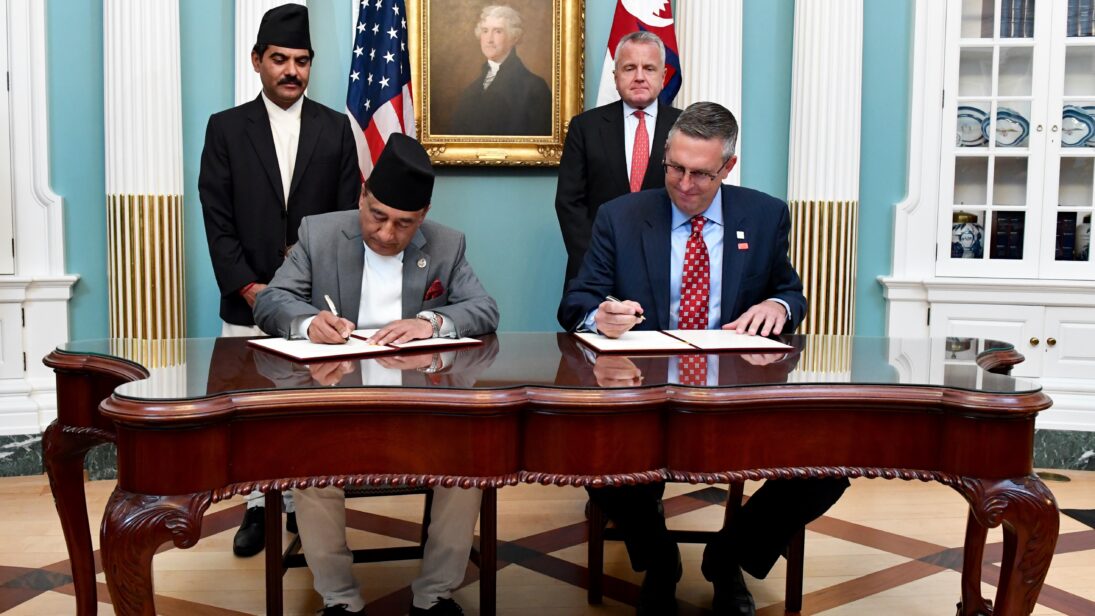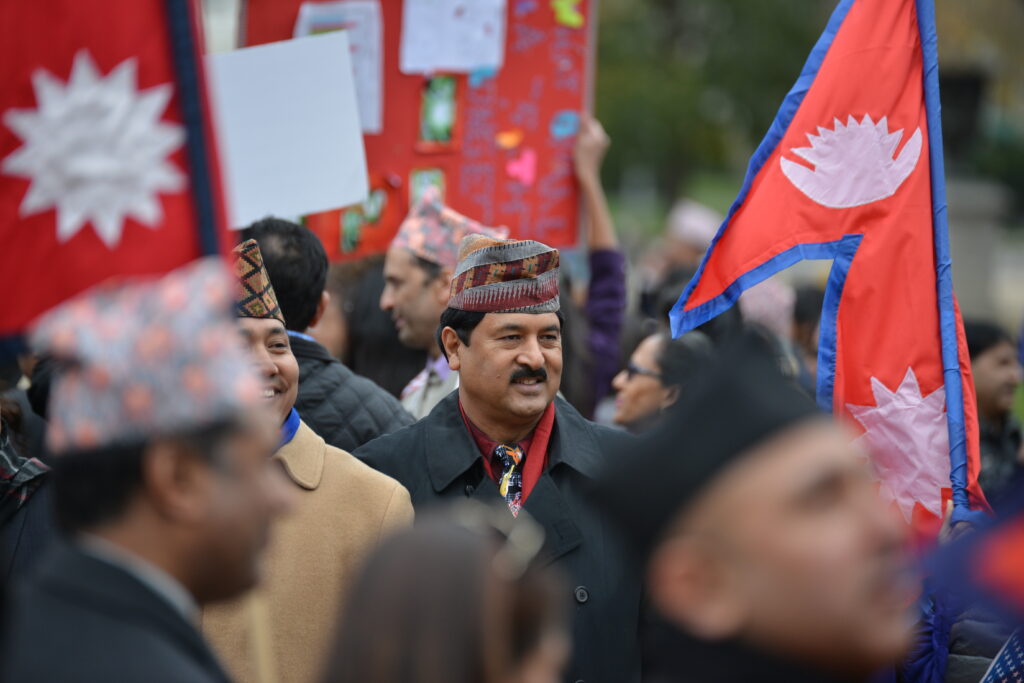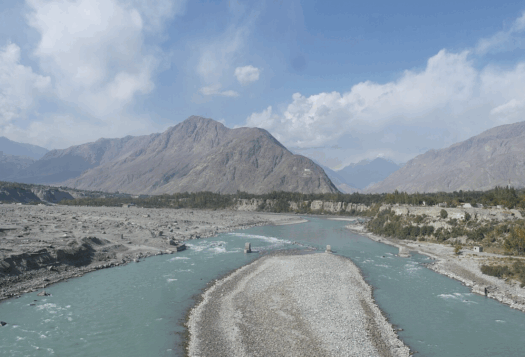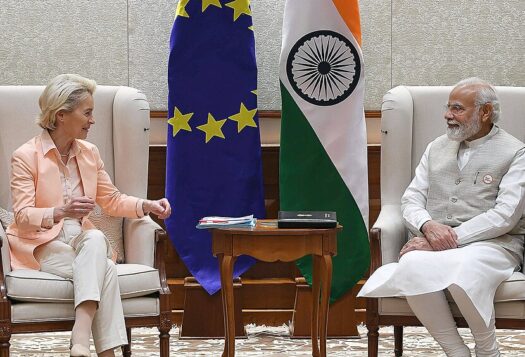
On February 27, demonstrations by several Nepali political parties shut down schools, disrupted transport across the country, and even led to clashes with the police that left many injured. The source of this contention was the parliamentary ratification of the Millennium Challenge Corporation compact: a USD $500 million grant provided by the United States to Nepal for improving the electrical transmission lines and road network, with an additional amount of USD $130 million provided by the Nepali government. Opponents of the deal have claimed that certain provisions of the MCC agreement are detrimental to Nepal’s sovereignty and violate its constitution. They also accused the MCC of being a U.S. ploy to stamp its influence in Nepal and contain China. In response, U.S. and Chinese officials have issued statements in favor and against the MCC agreement respectively, reflecting their current geopolitical tussle in South Asia.
Even though the MCC compact has been ratified, public perception is still divided on the deal. Although China is Nepal’s immediate neighbor and both countries enjoy a cordial relationship, Nepal seeks developmental aid from all friendly countries, including the United States—one of its most important development partners for the past seventy years. The fortified US-Nepal relationship is not at China’s cost. Therefore, it is incumbent on the U.S. and Nepali governments to dispel any legal, constitutional, and geopolitical doubts regarding the agreement and complete any projects under the MCC in a time-bound manner that aids Nepal’s economic growth and development. However, Nepal should also be careful to maintain a fine balance in relations between the United States and China, prioritizing Nepal’s national interests instead of succumbing to great power politics.
MCC Controversy in Nepal
The MCC is a U.S. foreign assistance agency that provides grants to developing countries in various sectors, such as agriculture, energy, and transport infrastructure. Although Nepal entered talks to receive aid under the MCC in 2011, the two countries only signed a formal agreement in September 2017 during the visit to the U.S. by the then-finance minister of Nepal, Gyanendra Bahadur Karki. In the domestic realm, opponents of the MCC expressed concerns that the compact would undermine Nepal’s sovereignty and prevail over Nepal’s constitution. Rumors even spread that the U.S. Army would make Nepal a base during the implementation phase of the compact. From the geopolitical perspective, many voiced that Nepal should reject the MCC to avoid participating in the U.S. ploy to counter Nepal’s immediate neighbor, China, with concerns that the U.S. would attempt to extend its presence in Nepal beyond the stipulated term five-year term of the project.
…It is incumbent on the U.S. and Nepali governments to dispel any legal, constitutional, and geopolitical doubts regarding the agreement and complete any projects under the MCC in a time-bound manner that aids Nepal’s economic growth and development.
As the MCC has proved to be controversial amongst the Nepali public, the best way to refute allegations and suspicions against the MCC is for the United States and Nepal to maintain transparent and efficient working methods to produce more visible results sooner rather than later. Problems with locals might arise while acquiring land for building the transmission lines at various places, requiring stakeholders to maintain sensitivity and clarity when dealing with public-facing issues to produce more trust in the MCC. The Nepali and U.S. governments must also work together to ensure that the projects are completed within the five-year deadline without breaching Nepal’s constitutional and legal provisions to dissuade any suspicion that the MCC compact unduly benefits the U.S. against Nepal’s national interests. If implemented effectively, the MCC can help build Nepal’s electrical transmission links and revamp road networks needing an overhaul, which will improve Nepal’s hydropower potential and connectivity respectively.
Geopolitical Dimensions of the MCC
The controversy over MCC also extends to the strategic competition between the U.S. and China for influence in South Asia. In an unprecedented move, a Chinese foreign ministry spokesperson stated on February 18 that it opposed coercive diplomacy in Nepal, referencing a telephone call made by US Assistant Secretary of State for South and Central Asian Affairs Donald Lu to Nepali leaders urging them to endorse the MCC. Responding to the statement, the U.S. embassy in Nepal issued a statement reiterating that the MCC agreement was Nepal’s sovereign decision. During the war of words between the two countries over Nepal, Nepal’s foreign ministry came out with its own statement clarifying that accepting any grant would be decided by the Nepali parliament based on its national interest. Chinese Foreign Minister Wang Yi also visited Nepal on March 25, indicating that Beijing wanted to demonstrate its presence in Nepal in the aftermath of the MCC’s ratification. The Chinese foreign ministry press release quoted Wang mentioning that China opposes attempts to play geopolitical games: a veiled reference to the growing US engagement in Nepal. Aware of Nepal’s geostrategic importance, both the countries are vying to make their presence felt in the Himalayan nation.

Nepal’s foreign policy has been guided by the principles of non-alignment, Panchsheel, and accepting or rejecting any grant is a sovereign decision of Nepal to keep its national interests at the center of its foreign policy. While Nepal enjoys cordial relations with both China and the United States, it should remain aware that these countries will always have their own interests in mind and should be careful that they do not use Nepal’s sensitive geopolitical position to further their great-power rivalry, as has happened with other small states in the region. Nepal should state clearly to its development partners that grants and loans should not contain any sort of strategic and military bearings.
The Nepali government should also reassure China that its adoption of the MCC compact will in no way harm China’s national security interests in Nepal. Kathmandu has always adhered to the One China policy and has clamped down on anti-China protests from Tibetan refugees. Nepal will have to fine-tune its diplomatic skills and orient its foreign policy to reap the benefits of development aid without ruffling the feathers of the existing geopolitical environment. Nepal should be aware of the pitfalls of succumbing to great power competition and assert its capability of making its own decisions to protect its national interests.
As long as the MCC remains focused on aiding the country’s developmental needs without compromising the national interests of Nepal and its neighbors, unnecessary suspicion and vilification of the deal should stop.
Conclusion
As long as the MCC remains focused on aiding the country’s developmental needs without compromising the national interests of Nepal and its neighbors, unnecessary suspicion and vilification of the deal should stop. Nepal must be careful not to allow the United States and China to play geopolitical games in the country under the pretext of MCC, as it is crucial to sustain both relationships. The successful completion of projects under the MCC will elevate the US-Nepal ties to new heights. Since the MCC aid is in the form of a grant and not a loan, it can aid Nepal’s development in the energy and infrastructure sector. The government should also ensure administrative and legal sanctity so that the project can be completed by the MCC within the stipulated timeframe of five years. As most of the mainstream political parties have supported the deal, the implementation phase should be less troublesome although the government must continue to anticipate protests from fringe political parties. After all the debates, disputes, and deliberations, Nepal’s parliament has finally ratified the MCC, and it is only logical that the project should move ahead swiftly for the benefit of Nepal and its people.
***
Image 1: U.S. State Department via Flickr
Image 2: S Pakhrin via Flickr


